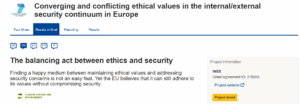Since 2002, CECLS has participated in several European Research Framework Programmes:
Converging and Conflicting Ethical Values in the Internal/External Security Continuum in Europe. The aim of the INEX (converging and conflicting ethical values in the internal/external security continuum in Europe) project is to contribute to existing understandings of European security through an innovative analysis of the value based premises and ethical consequences of the internal/external security continuum. While this continuum is studied in ongoing research, it contains essential value assumptions and ethical consequences that have remained largely under-studied, with significant consequences for both European policy and law-making in further security practices. It is the aim of the project to fill this lacuna by supplementing the current state-of-the art research on the continuum with an ethical and value-oriented analysis. Thus, INEX advances and tests the hypothesis that the practices that make up the internal/external security continuum are driven by an implicit logic of ethical values, that these values contribute significantly to structuring the continuum of security practices, and that they consequently have significant implications for the how present and future security policy should be formulated and implemented. The Changing Landscape of Justice and Home Affairs Cooperation in the European Union and EU-Canada Relations Funded by the European Commission in conjunction with the Canadian government, the EU-Canada programme brought together five European and Canadian partners: CCLS, Université de Montréal, the University of Victoria, the University of Toronto and the Centre for European Policy Studies. The Changing Landscape of European Liberty and Security is a research project on contemporary transformations in the relationship between liberty and security, funded by the Sixth Framework Programme of the European Commission’s Directorate General for Research. The project involved 23 universities and research institutes across Europe for a period of five years. Given the importance of liberty and security as values both within Europe and beyond, the project considered a wide array of trends, situations, institutions and debates over competing principles and legal norms. A large number of books, articles and policy briefs have been published within the framework of the project. European liberty and security: security issues, social cohesion and institutional development of the european union The ELISE project – European Liberty and Security: Security Issues, Social Cohesion and Institutional Development of the European Union (EU) –aimed at developing adequate conceptual tools for a better understanding of security issues in modern European societies, while at the same time providing a framework for policy responses to future crises which do not undermine civil liberties, human rights and social cohesion. To achieve this, ELISE has proceeded in three complementary directions. First, it has sought to develop a better and more comprehensive understanding of contemporary security challenges. Second, it has sought to develop a detailed account of the development of security policies at both the national and EU levels – especially in the aftermath of events such as those of 11 September 2001 – and of their impact on EU societies and their cohesion. Third, it has sought to identify the primary institutional challenges now confronting both Member States and the EU as a consequence of the many forces that are reshaping the relation between liberty and security in many different contexts. INEX (2008-2011)
EU-CANADA (2007-2009)
CHALLENGE (2002-2007)
ELISE 2002-2004


